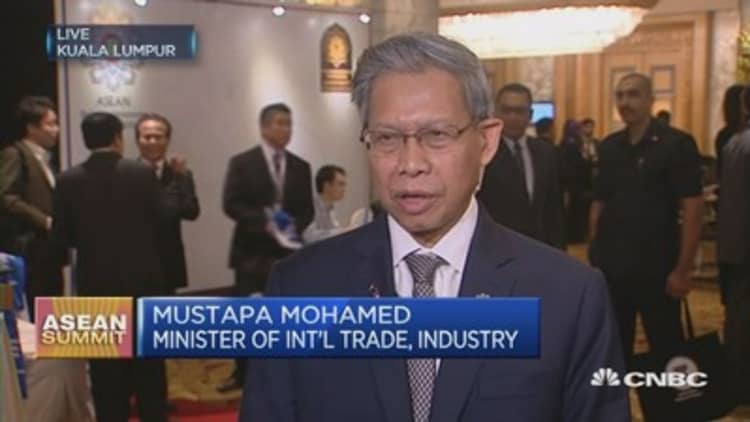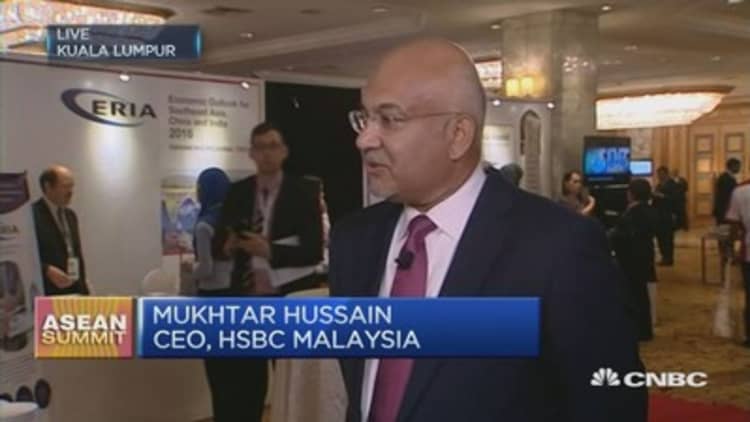


Malaysia's markets have taken a beating from commodity price drops and a political scandal, and one opposition politician believes the country could now face a financial crisis.
Wong Chen, a member of Malaysia's parliament and a noted critic of the ruling Umno (United Malays National Organization) party headed by Prime Minister Najib Razak, told CNBC on Friday that the country's economic and political health were closely linked.
"The biggest worrying factor is the domestic confidence level has plummeted due to [the] goods and services tax (GST) and also due to the fact that politically it's not very stable," Wong said, on the sidelines of the U.S.-ASEAN (Association of Southeast Asian Nations) Business Council conference in Kuala Lumpur.
Malaysia's GST of 6 percent, introduced in April to shore up government revenue, has proved unpopular and slowed consumer spending. At the same time, Malaysians are struggling with a high level of personal debt which, if defaults rise as Wong fears, could set off an economic blowup along the lines of the 1997 Asian Financial Crisis, which was caused by a surfeit of dollar-denominated debt.
"Domestically, the household debt level is quite high," said Wong, a member of the opposition Parti Keadilan Rakyat (PKR). "Even though there's no default, what it requires is constant wage growth, and it needs a growing economy and that's not happening."
Wong, who was previously worked on investment and trade in jailed opposition leader Anwar Ibrahim's party, the People's Justice Party, thinks consumer loan defaults may begin to show an increase in about six months. Household debt is relatively high at around 88 percent of gross domestic product (GDP), capping consumer spending.
Wong does note, however, that Malaysia's banking sector, which in the late 1990s was burdened by a slew of non-performing loans, is considerably healthier now.
But there is no escapting the fact the country's consumers are not happy campers: Market researcher Nielsen found that consumer confidence in Malaysia fell to 78 points over the July-September period, down 11 percentage points on the quarter, marking a record low since the survey began in 2005, as well as Southeast Asia's worst reading for the quarter.
Malaysia's economy is growing more slowly, although the government highlights that it's still growing at a decent clip. The government forecasts growth of 4.5-5.5 percent this year, although expectations are for the figure to come at the low end of the range, putting Malaysia in danger of its slowest growth since 2009, during the Global Financial Crisis, when the economy contracted.
The country has been hit particularly hard by fund outflows as it's seen as vulnerable to an expected U.S. Federal Reserve interest rate increase. Additionally, prices for its major commodity exports - crude oil and palm oil - have dropped sharply and its currency, the ringgit, is trading close to its lowest levels since the Asian financial crisis of the late 1990s.
The government, however, may be less concerned about the dropoff in the country's markets.
Mustapa Mohamed, Minister for International trade and industry, told CNBC on the sidelines of the ASEAN conference that the market moves, particularly the ringgit's decline, were overdone.
"There has been an overreaction to the reduction in oil prices," Mustapa said, noting that oil and other commodities accounted for just over 20 percent of exports, while manufacturing was more important at nearly 50 percent.
"The market has not been too kind to us, but our fundamentals remain strong," Mustapa said, citing the country's healthy trade balance and adding that the government's budget is on track.
"We think the worst is over hopefully," he said.
These troubles are occuring as Malaysia faces what may be its worst-ever political scandal, arising from the debt-ridden economic development fund, 1Malaysia Development Berhad (1MDB).
One of PM Najib's pet projects, the 1MDB fund was launched in 2008 to promote economic development.
It has been in the limelight for months amid allegations of false accounting, huge debt and, more recently, financial fraud. In July, the Wall Street Journal published a report alleging that nearly $700 million flowed from the fund to Najib's personal bank account.
Najib has said the funds were a private donation from Middle Eastern country, which he has declined to name. He is expected to provide an explanation to parliament on December 3, the last day of the current session. When contacted, a representative of the prime minister's office referred to Najib's previous comments denying wrong-doing.
Singapore and Switzerland have both suspended bank accounts tied to 1MDB and in the U.S., media reports said the Federal Bureau of Investigation (FBI) is investigating as well. Investigations in Malaysia have been dogged by accusations they were biased toward the government or halted entirely.
The fund is currently undergoing a "rationalization" program, launched in May, to reduce its debt of more than $11 billion by selling assets. In an October speech, the prime minister said he expects that under the plan, 1MDB would pay off its debt and resolve its cash-flow issues.
But Wong said Najib must close 1MDB to restore confidence in Malaysia.
"Closing 1MDB doesn't mean you have to just rationalize 1MDB," Wong told CNBC.
"You have to make sure people who were involved in it are punished so there's no more corporate impunity in Malaysia. If you don't do that, then it's a superficial white wash," Wong said. "There's no point just saving 1MDB from a financial crisis. You have to punish people to send a right message. That he's ready for reforms."
Despite allegations that domestic attempts to investigate 1MDB face roadblocks, Najib said in an October speech that he had ordered independent investigations.
"If any evidence of wrongdoing is found, I can assure you that appropriate action will be taken against those responsible," Najib said at the time.





